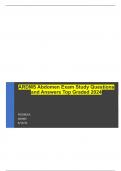ARDMS Abdomen Exam Study Questions
and Answers Top Graded 2024
POSSIBLEA
ARDMS
8/13/24
,ARDMS Abdomen Exam Study Questions and Answers Top Graded 2024
Left lobe of the liver is divided into medial and lateral segments by what? -
Left hepatic vein
Left lobe of the liver is separated from the caudate lobe by what? -
ligamentum venosum
Right lobe of the liver is divided into anterior and posterior segments by
what? - Right hepatic vein
Main lobar fissure - The main lobar fissure separates the right and left lobes
of the liver.
It is visualized sonographically as an echogenic linear structure extending
from the portal vein to the neck of the gallbladder
**landmark for identifying the gallbladder
Falciform ligament - Attaches the liver to the anterior abdominal wall
Extends from the diaphragm to the umbilicus
Separate the right and left subphrenic spaces
Ligamentum venosum - The ligamentum venosum is a remnant of the fetal
ductus venosus. It divides the caudate lobe from the left lobe.
Ligamentum teres - Lies within the falciform ligament, remnant of the fetal
umbilical vein***, courses within the left intersegmental fissure, dividing
the left lobe into medial and lateral segments
Main Portal Vein diameter should not exceed: - 13 mm or 1.3 cm
Hepatomegaly - Etiology: congestive heart failure, inflammatory processes,
polycystic disease, fatty infiltration, biliary obstruction, neoplasm, budd-
chiari syndrome
Sonographic characteristics: Length exceeding 18 cm, Anterior-posterior
diameter exceeding 15 cm
Alkaline Phosphatase - An enzyme produced primarily by the liver, bone,
and placenta and excreted through the bile ducts
Marked elevation is associated with obstructive jaundice
Alpha-fetoprotein - A protein normally synthesized by the liver, yolk sack,
and GI tract of the fetus
, ARDMS Abdomen Exam Study Questions and Answers Top Graded 2024
Nonspecific marker for malignancy
Alanine Aminotransferase (ALT) - An enzyme found in large concentration
in the liver and lower concentrations in the heart, muscle, and kidneys
Remains elevated longer than AST
Elevation associated with cirrhosis, hepatitis, and biliary obstruction
Mild elevation associated with liver mets
Aspartate Aminotransferase (AST) - An enzyme present in many types of
tissues that is released when cells are damaged or injured; levels will be
proportional to the amount of damage and time between cell injury and
testing
Associated with hepatitis, cirrhosis, and Mononucleosis
Prothrombin time - Normal clotting time is 10-15 seconds
enzyme produced by the liver
production depends on amount of Vitamin K
elevation associated with cirrhosis, malignancy, malabsorption of Vitamin
K, and clotting failure
Decreases with subacute or acute cholecystitis, internal biliary fistula,
carcinoma of the GB, injury to the bile ducts, and prolonged extrahepatic
biliary obstruction
Hepatic Candidiasis - Fungal infection
Immune-suppressed patients, Fever, chills, abdominal pain, palpable liver
Uniformly hypoechoic lesions within the liver parenchyma, thick wall
margins, hepatomegaly, may demonstrate a target or "wheel within a wheel,"
hyperechoic lesions with posterior shadowing
Echinococcal cyst - Parasitic infection (Echinococcus granulosum)
***Sheep farmers
RUQ pain, fever, leukocytosis, hepatomegaly, elevated alkaline phosphatase
Septated cystic mass (honeycomb appearance)
Mobile internal echoes (snowflakes)
Cyst containing small cysts (daughter cysts)
Hepatitis - Fatigue, loss of appetite, fever and chills, nausea, nonobstructive
jaundice, marked elevation in aspartate aminotransferase, alanine
aminotransferase and bilirubin
Normal-appearing liver parenchyma




